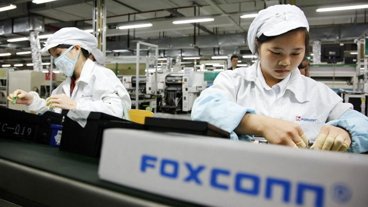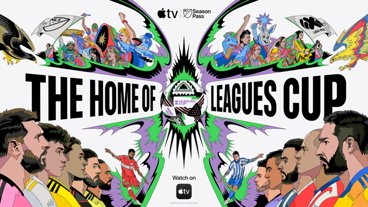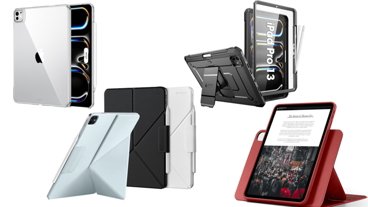Apple's Tim Cook dismisses Android iPad competitors as bizarre, vapor
Cook, who serves as Apple's chief operations officer, first described tablet products running Windows as being "big, heavy, expensive, weak battery life, and need a keyboard or stylus," noting that customers have shown no interest in the products.
A second group of tablets Cook characterized as running a version of Android that "isn't designed for a tablet," adding that Google itself had stated this, and that it wasn't just the opinion of Apple.
Apple's chief executive Steve Jobs made similar comments in the company's previous quarter's conference call, rhetorically asking, "even Google is saying don't use Froyo [the current release of Android OS], and instead to wait to use next years' version. What does it mean when a software maker says not to use their release and you use it anyway?"
Jobs comments appeared to be directed at Samsung's Galaxy Tab and Dell's Streak, two of the more visible Android tablets that became available last year. Cook also echoed Jobs' sentiments on 7 inch tablets from RIM and Android licensees, saying "you wind up having the size of a tablet that’s less than reasonable. Or one that’s not even a real tablet experience. It’s a 'scaled-up smartphone.' That’s a bizarre product in our view."
Apple's "bizarre" is another firm's "odd"
Web developer Sencha made similar observations in its review of the Galaxy Tab as a potential web development target.
While the tablet fits physically between the size of a smartphone and the iPad, the company noted, "One of the oddest aspects of the Galaxy Tab browser is its CSS pixel to device pixel ratio.
"When queried in landscape mode, the Galaxy reports a screen.width of 683px and screen.height of 334px. Since the actual device resolution offers 1024×600, it’s giving us a 1.5× ratio of device to CSS pixels. This is a little bit of an odd choice since there shouldn’t be any reason why it can’t offer a 1:1 device-to-CSS-pixel ratio (or even just match the iPhone/Nexus One convention of a 320 pixel device.width — which would give it a 1.875 ratio). This makes the Galaxy slightly bigger than a regular phone screen in CSS pixels, but not really big enough to handle what people want to put in a tablet screen."
The firm concluded, "the practical effect of this decision is that the Galaxy Tab is effectively an 'over-sized phone' for the purposes of web content. For example, an iPad-style side-navigation section just won’t fit on the screen. We think it’s probably best to treat it as a phone with big pixels rather than a true tablet."
New Android tablets still vaporware
Cook wrapped up his evaluation of currently shipping Android tablets by saying, "Those are what is shipping today. If you do a side-by-side with an iPad, some enormous percentage are going to pick the iPad. We have no concern there."
As far as the next generation of Android tablets, Cook said, "There’s nothing shipping yet, and they lack performance specs and pricing. Today they’re vapor. However, we’re not sitting still. We have a huge first-mover advantage. And a huge user advantage from iTunes to the App Store. Huge number of apps and an ecosystem. We’re very confident entering into a fight with anyone."
While Cook regularly describes the percentage of the Fortune 100 and Financial Times Europe 100 businesses supporting or evaluating the iPhone and iPad, this quarter he specifically noted companies that were deploying the iPad, a list that included JPMorgan, Wells Fargo, Archer Daniels Midland, and DuPont. Cook also said that over 80% of the Fortune 100 are now deploying or piloting iPad, up from 65% in the previous quarter, and that employee demand for iPad in the corporate environment is strong.
 Daniel Eran Dilger
Daniel Eran Dilger













 Amber Neely
Amber Neely
 Thomas Sibilly
Thomas Sibilly
 AppleInsider Staff
AppleInsider Staff
 William Gallagher
William Gallagher
 Malcolm Owen
Malcolm Owen
 Christine McKee
Christine McKee










215 Comments
Really? Vaporware? They just announced their tablets like a week and a half ago.
Three months from now if there is nothing, that's vaporware. Sheesh.
While the tablet fits physically between the size of a smartphone and the iPad, the company noted, "One of the oddest aspects of the Galaxy Tab browser is its CSS pixel to device pixel ratio.
"When queried in landscape mode, the Galaxy reports a screen.width of 683px and screen.height of 334px. Since the actual device resolution offers 1024×600, it?s giving us a 1.5× ratio of device to CSS pixels. This is a little bit of an odd choice since there shouldn?t be any reason why it can?t offer a 1:1 device-to-CSS-pixel ratio (or even just match the iPhone/Nexus One convention of a 320 pixel device.width ? which would give it a 1.875 ratio). This makes the Galaxy slightly bigger than a regular phone screen in CSS pixels, but not really big enough to handle what people want to put in a tablet screen."
The firm concluded, "the practical effect of this decision is that the Galaxy Tab is effectively an 'over-sized phone' for the purposes of web content. For example, an iPad-style side-navigation section just won?t fit on the screen. We think it?s probably best to treat it as a phone with big pixels rather than a true tablet."
Daniel, this is a news site. Regurgitating old headlines every time Android is mentioned is again, kicking a dead horse.
So if 88 of 100 Fortune 100 companies are supporting the iPhone, and 80 the iPad, who are the IT fascists holding up deployment at the other companies?
So if 88 of 100 Fortune 100 companies are supporting the iPhone, and 80 the iPad, who are the IT fascists holding up deployment at the other companies?
Maybe sprockkets above you?
There are a lot of companies that hope to capture what Apple has with the iPad.
Tablets like coby and galaxy tab just don't have what it takes to be competition for the iPad.
I would be afraid to by an android tablet seeing that their phone OS is fragmented because of manufacturers like Samsung.
I highly doubt Samsung will bother with more than one major update for the galaxy before they move on to something else. Coby is just a cheap knock off.
I think the BB tablet and the HP tablet may have some followers. The main problem with both of those options are apps. Apps are what make the device Useful, fun etc. and Apple has those.
BB and HP will release with a very small selection of apps compared to the iPad.
(And, with the BB option, it tries to tie to you owning a sucktastic BB phone as well? Not happening)
If I were to buy a tablet, which I don't see myself doing in the near future, It would be the ipad2.
7" screens are too small and I wouldn't buy anything from BB. That leaves the Hp tablet. I really like the look and feel of Web OS, and on a tablet it would likely be "cool", but it won't have an app store like Apple iTunes. ( yes, it will have an app store obviously, it just won't have near the apps quantity of iTunes)
Just like WP7 phones have a great OS, but the Marketplace lacks in a big way compared to Apple.
I thought Apple needed to look at a 7" form factor until I checked out an iPad in the flesh. It is the correct size in that it's not nearly as large as one might imagine. Smaller doesn't make sense just as 9" netbooks have proven to be lousy laptops.
The competition has been done in by one element of the iPad that doesn't get nearly enough ink. Apple is offering a $500 10-inch tablet while the competition can only approach that price by reducing their devices down to a 7" screen form factor.
The perceived value of iPad 2, which I suspect is weeks away from being released, will be even more of a challenge for the competition.
Bottom line is, making the iPad is a fine accomplishment but making the iPad a 10" device checking in at a starting price of $500, incredible. The competition is reeling and might never recover.